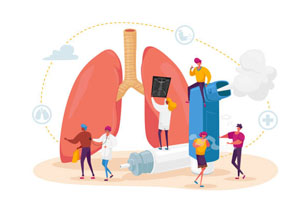Discover the path to a healthier, smoke-free life Explore the strategies, support systems, and health benefits of quitting smoking for good Get answers to common questions about the journey to a smoke-free you
The Challenge of Quitting Smoking
Quitting smoking is a journey that millions embark on every year. It's a challenge that goes beyond just breaking a habit; it's about reclaiming your health, well-being, and freedom from the grasp of tobacco addiction. The journey to quit smoking can be both demanding and rewarding, and in this article, we'll explore the strategies, tools, and motivation you need to overcome this habit once and for all.
Understanding the Dangers of Smoking
Before delving into the process of quitting, it's essential to grasp the critical reasons why smoking is considered one of the most harmful habits. Smoking is not just a matter of inhaling smoke; it's an act that releases over 7,000 toxic chemicals into your body with every puff. These chemicals lead to a wide range of health issues, from lung cancer and heart disease to respiratory problems and decreased life expectancy. By understanding these dangers, you can bolster your resolve to quit and take charge of your health.
Long-Term Health Consequences
Smoking takes a severe toll on your health over time. It's not only about the immediate risks but also the long-term consequences that can drastically reduce your quality of life. Smoking is linked to a myriad of health issues, including chronic obstructive pulmonary disease (COPD), stroke, and various cancers. Moreover, it accelerates the aging process, resulting in premature wrinkles, yellowed teeth, and decreased vitality. The longer you smoke, the higher the cumulative damage to your health. Quitting smoking is not just a decision for today; it's a commitment to a healthier, happier tomorrow.

The Health Risks of Smoking
Understanding the Dangers of Smoking
Smoking is more than just a habit; it's a significant health risk that affects nearly every organ in your body. Cigarette smoke is packed with toxins, including tar, nicotine, and carbon monoxide, that have detrimental effects. Nicotine is highly addictive, making it challenging to quit, while tar and other chemicals damage your lungs and airways, increasing your risk of respiratory conditions like chronic bronchitis and emphysema.
The Impact on Cardiovascular Health
Smoking has a profound effect on your heart and circulatory system. The chemicals in tobacco smoke can damage your blood vessels, causing a buildup of fatty substances that narrow your arteries. This increases the risk of atherosclerosis, leading to heart disease and stroke. Smoking also raises your blood pressure and heart rate, putting additional strain on your cardiovascular system.
Lung Cancer and Respiratory Issues
Lung cancer is perhaps the most well-known risk associated with smoking. The carcinogens in tobacco smoke can lead to the development of cancerous cells in the lungs. Beyond lung cancer, smoking is a primary cause of many respiratory problems, including chronic obstructive pulmonary disease (COPD). Coughing, shortness of breath, and reduced lung function are common among smokers, and these issues can significantly impact your quality of life.
Risks Beyond the Lungs and Heart
Smoking doesn't stop at lung and heart issues; it affects your entire body. It's linked to various cancers, including those of the mouth, throat, esophagus, pancreas, bladder, and more. Smoking also damages your teeth and gums, contributing to oral health problems. Furthermore, it has been associated with fertility issues, complications during pregnancy, and a higher risk of birth defects.
The Economic and Social Costs
Smoking also has broader implications for society. The healthcare costs associated with treating smoking-related diseases are immense. Additionally, smoking contributes to lost productivity and increased healthcare expenses, which impact both individuals and society as a whole. Beyond the financial costs, smoking can also strain relationships and limit social interactions due to the odor and health risks associated with secondhand smoke exposure.
Why Quitting Is Essential
The Benefits of Quitting Smoking
Quitting smoking is one of the most important decisions you can make for your health and well-being. It comes with a range of compelling benefits, including:
- Improved Lung Health: Your lung function begins to improve as early as a few weeks after quitting. Breathing becomes easier, and the risk of respiratory infections decreases.
- Reduced Risk of Disease: Quitting significantly lowers your risk of heart disease, stroke, and various cancers, such as lung, mouth, and throat cancers.
- Longer Life Expectancy: Studies show that quitting smoking can add years to your life. The sooner you quit, the more you benefit in terms of longevity.
- Enhanced Quality of Life: As you quit, your sense of taste and smell improve, food becomes more enjoyable, and you regain energy and vitality.
Motivation to Quit
Finding motivation to quit smoking is essential for success. Motivation often stems from personal reasons that resonate with individuals. These reasons may include:
- Health Concerns: Concerns about the health risks of smoking and a desire for better health are common motivating factors.
- Family and Loved Ones: Many people quit for the sake of their loved ones, especially children and family members who are affected by secondhand smoke.
- Financial Benefits: The cost of smoking adds up over time. Saving money and redirecting it towards other goals can be a strong motivator.
- Improved Self-Image: Quitting can boost self-esteem and self-image, as you take control of your life and health.
Breaking Free from Addiction
Understanding that smoking is not just a habit but also a powerful addiction is crucial. Nicotine, a highly addictive substance in cigarettes, alters the brain's chemistry and creates a dependency. Breaking free from this addiction is essential to regain control of your life and health.
Protecting Your Loved Ones
Quitting smoking is not only about personal health but also about protecting the health of those around you. Secondhand smoke can be harmful to family members and friends. By quitting, you become a positive influence and set a healthy example for your loved ones.
How to Begin the Quitting Process
Setting a Quit Date
Setting a quit date is a crucial first step in the quitting process. Choose a specific date within the next few weeks that marks the beginning of your smoke-free journey. This provides you with a clear goal to work towards and mentally prepares you for the change. Inform your family and friends about your quit date, as their support can be invaluable.
Creating a Support System
Quitting smoking is more manageable with a strong support system in place. Reach out to friends and family members who can provide encouragement and understanding. Consider joining a smoking cessation program or support group, either in person or online. These groups offer a sense of community and shared experiences, making the journey less daunting.
Identifying Triggers
Understanding your smoking triggers is essential for successful quitting. Identify situations, emotions, or habits that make you reach for a cigarette. Common triggers include stress, social situations, and daily routines. Once you recognize these triggers, you can develop strategies to cope with them without resorting to smoking. This might involve stress-reduction techniques, finding alternative activities, or changing routines to avoid triggers.
Clearing Your Environment
Make your surroundings smoke-free. Remove cigarettes, lighters, and ashtrays from your home, car, and workplace. This eliminates the physical cues that prompt smoking. Clean your living spaces to remove the scent of smoke, making it a more pleasant environment. Consider asking friends and family not to smoke around you to create a supportive atmosphere.
Educating Yourself
Knowledge is a powerful tool in the quitting process. Learn about the health risks of smoking and the benefits of quitting. Understanding the physical and psychological aspects of addiction can help you prepare for challenges and stay committed to your goal. There are numerous resources, books, and websites dedicated to smoking cessation that provide valuable information and tips.
Seeking Professional Help
If you find it challenging to quit on your own, don't hesitate to seek professional help. Your healthcare provider can offer guidance and may prescribe smoking cessation medications or therapies that can make the process more manageable. These options can significantly increase your chances of quitting successfully.
Methods to Quit Smoking
Nicotine Replacement Therapy
Nicotine replacement therapy (NRT) is a widely used method to help individuals gradually reduce their nicotine dependence. These products provide controlled doses of nicotine without the harmful chemicals found in cigarettes. Common NRT options include nicotine gum, patches, lozenges, inhalers, and nasal sprays. They can help alleviate withdrawal symptoms and cravings while you work towards quitting. It's essential to follow the recommended dosage and usage guidelines for the specific NRT product you choose.
Prescription Medications
Prescription medications can be a valuable tool in smoking cessation. Two commonly prescribed medications are Bupropion (Zyban) and Varenicline (Chantix). Bupropion is an atypical antidepressant that can reduce withdrawal symptoms and cravings. Varenicline is a medication that reduces withdrawal symptoms and blocks nicotine receptors in the brain, making smoking less satisfying. These medications are typically used under the guidance of a healthcare provider, and it's important to discuss potential side effects and contraindications with your doctor.
Behavioral Therapy and Counseling
Behavioral therapy and counseling are essential components of many successful quit-smoking programs. Cognitive-behavioral therapy (CBT) helps individuals identify and manage triggers and cravings. It equips you with the skills to change smoking-related behaviors and thought patterns. Motivational interviewing is another effective approach that helps individuals find their personal motivation to quit and set achievable goals. Individual or group counseling sessions can provide emotional support, strategies for coping with cravings, and a sense of community with others on the same journey.
Mobile Apps and Online Support
In the digital age, mobile apps and online support communities offer a convenient and accessible way to quit smoking. There are numerous apps designed to track your progress, offer motivation, and provide strategies for staying smoke-free. Online forums and communities connect you with others who are also quitting and can be a valuable source of advice and encouragement. These digital resources can complement traditional methods and provide additional support on your journey to quit smoking.
Holistic Approaches
Some individuals opt for holistic approaches to quitting smoking. These methods include acupuncture, meditation, yoga, and mindfulness practices. While the scientific evidence for their effectiveness may vary, many people find these holistic approaches valuable in reducing stress, managing cravings, and improving overall well-being. If you're considering holistic methods, it's essential to consult with qualified practitioners and integrate them into your overall quit plan.
Cold Turkey
Going "cold turkey" means quitting smoking abruptly without the use of NRT or prescription medications. While it's the most challenging method, it's also the most cost-effective and straightforward. It requires a strong commitment and a well-prepared plan. Some individuals prefer this method, as it offers immediate cessation and avoids any potential side effects of medications or NRT. It's important to be mentally prepared and have a support system in place when choosing the cold turkey approach.
Maintaining Smoke-Free Habits
Coping with Cravings
Even after successfully quitting, you may experience occasional cravings for a cigarette. Coping with these cravings is crucial to maintaining your smoke-free status. Here are some strategies to help:
- Deep Breathing: Take slow, deep breaths to calm your mind and reduce the intensity of cravings.
- Stay Busy: Engage in activities that keep your hands and mind occupied, such as walking, chewing sugar-free gum, or solving puzzles.
- Distract Yourself: Redirect your attention away from cravings by calling a friend, watching a movie, or pursuing a hobby you enjoy.
- Remind Yourself of the Benefits: Reflect on the health and financial benefits of quitting whenever cravings strike to reinforce your commitment.
Building a Healthy Lifestyle
Quitting smoking is a perfect opportunity to embrace a healthier lifestyle. Here are some ways to incorporate healthy habits into your daily life:
- Regular Exercise: Physical activity can help reduce stress, improve mood, and prevent weight gain often associated with quitting. Find an activity you enjoy and make it a regular part of your routine.
- Balanced Diet: Eating a well-balanced diet rich in fruits, vegetables, and whole grains not only supports your health but can also help with managing cravings and preventing weight gain.
- Stay Hydrated: Drinking plenty of water can help flush toxins from your body and keep you hydrated, which is essential for overall well-being.
- Manage Stress: Stress can trigger cravings, so incorporating stress-reduction techniques like meditation, yoga, or deep breathing exercises can be valuable.
Relapse Prevention
Relapse is a common part of the quitting process, but it doesn't mean failure. It's essential to be prepared to prevent relapse and get back on track if it happens. Strategies for relapse prevention include:
- Identify Triggers: Recognize situations or emotions that might lead to relapse, and develop strategies to cope with them effectively.
- Seek Support: Reach out to your support system, whether it's friends, family, or a support group, if you feel at risk of relapse.
- Learn from Relapses: Treat relapses as learning opportunities. Understand what led to the relapse and use that knowledge to strengthen your quit plan.
- Stay Committed: Maintain a strong commitment to quitting. Remind yourself of the reasons you wanted to quit in the first place and stay focused on your long-term goals.
FAQs About Quitting Smoking
Q1: What are withdrawal symptoms, and how can I cope with them?
A1: Withdrawal symptoms are the body's way of reacting to the absence of nicotine, and they can include irritability, cravings, anxiety, and trouble concentrating. To cope with these symptoms, engage in deep breathing exercises, keep yourself busy, and remind yourself of the benefits of quitting. Additionally, consider seeking support from friends, family, or support groups.
Q2: Is it too late to quit if I've been smoking for many years?
A2: It's never too late to quit smoking. Quitting at any stage offers significant health benefits. Even if you've been smoking for years, your body can start to heal as soon as you quit. You'll reduce your risk of smoking-related diseases and experience improvements in your overall health.
Q3: What are the best strategies for preventing relapse?
A3: Preventing relapse is essential for maintaining a smoke-free lifestyle. Strategies include identifying and avoiding triggers, seeking support from your network, learning from any relapses that may occur, and staying committed to your quit plan. Remember that relapses can happen, but they don't have to be permanent setbacks.
Q4: Can I quit smoking without professional help?
A4: Yes, it's possible to quit smoking without professional help. Many people have successfully quit on their own or with the support of friends and family. However, professional assistance, such as counseling or prescription medications, can significantly increase your chances of success and make the process more manageable.
Q5: What are the health benefits of quitting smoking at different stages?
A5: The health benefits of quitting smoking begin almost immediately. Within hours, carbon monoxide levels in your blood decrease, and your oxygen levels start to improve. Within days, your sense of taste and smell become more vibrant. In the longer term, your risk of heart disease, cancer, and respiratory issues decreases. The sooner you quit, the more significant and rapid these improvements will be.








